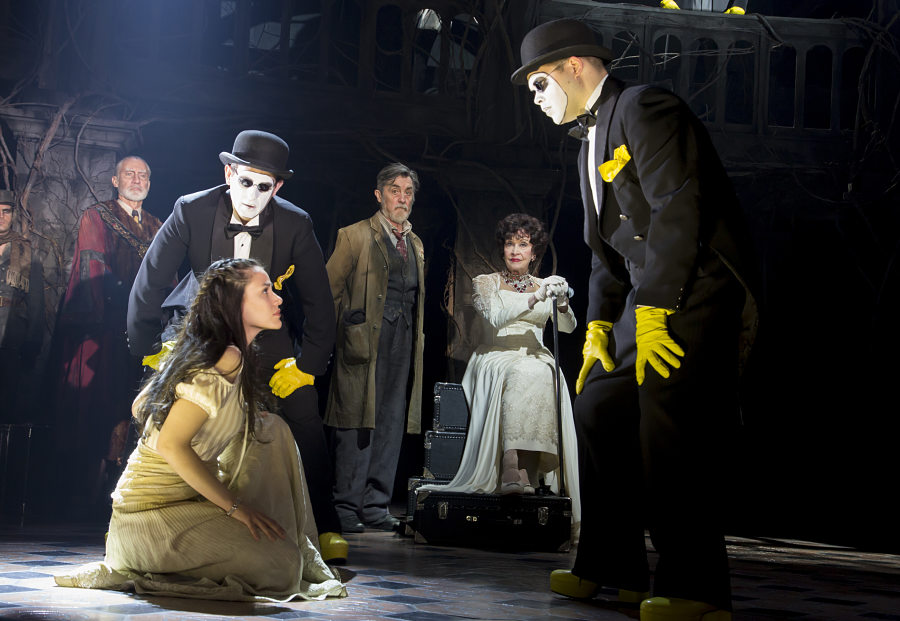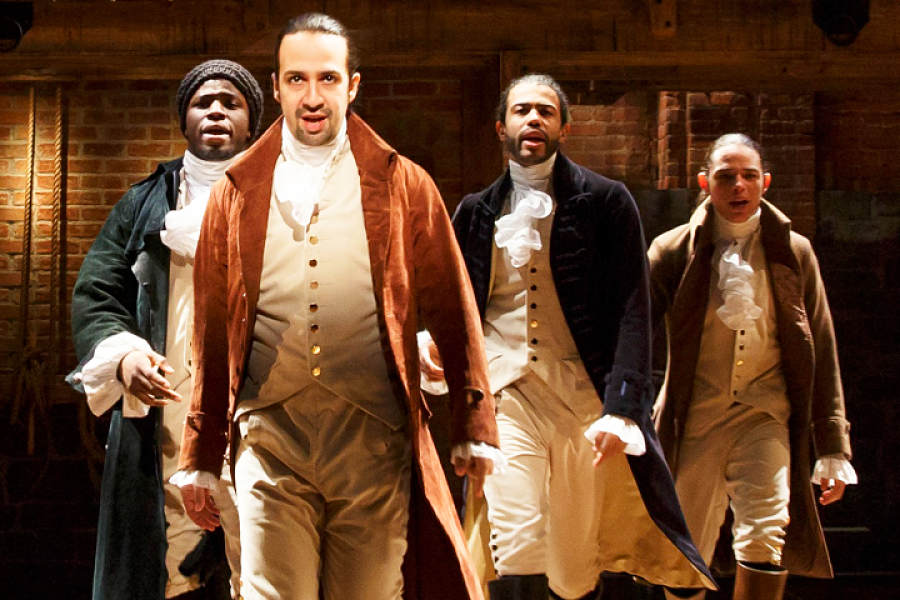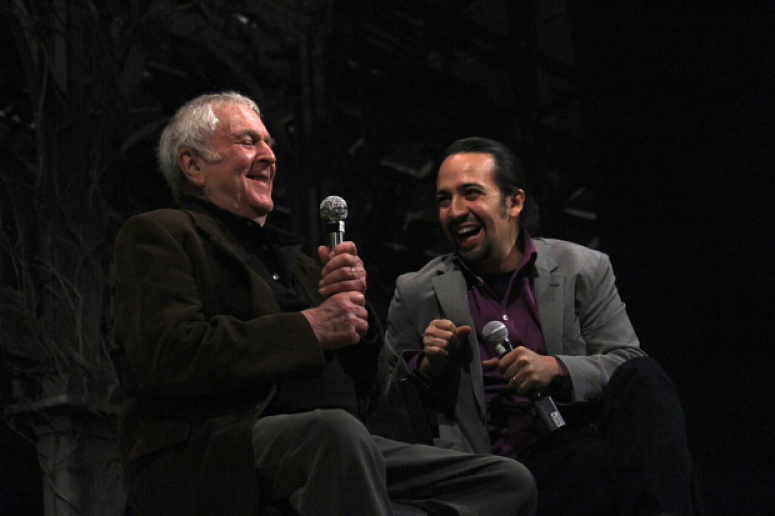NEW YORK CITY: There was no torch on hand to be passed between composer John Kander and composer/performer Lin-Manuel Miranda when they met for a talkback after the May 20 performance of Kander and Ebb’s The Visit at Broadway’s Lyceum. Such a gesture hardly seemed necessary, of course, for while Kander and Miranda are a few generations apart—their ages are 88 and 35, respectively—they talked shop like musical theatre colleagues.
Which they are: The Visit closed last weekend (while Kander and Ebb’s juggernaut Chicago shows no signs of slowing down), and in a month, Broadway previews begin for Hamilton, Miranda’s pop/hip-hop musical about the nation’s founding, which caused a sensation in its debut at the Public Theater earlier this year.
The event was hosted by Time Out New York. A slightly edited and condensed version of the conversation is below.
Lin-Manuel Miranda: We have been having lunches together ever since John came to see In the Heights on Broadway, and what struck me most the first time we had lunch was all he wanted to do was talk about music. So that’s what I want to talk about: I want to pretend we’re having french onion soup and we’re gonna talk music. So talk to me about The Visit.
John Kander: When we started work on this piece, it suddenly struck us that a story about an impoverished town where the richest woman in the world was coming to visit them, and the desire to keep that money in their town by marrying off this rich lady, is The Merry Widow. Dürrenmatt must have known that, and it was our feeling that he took The Merry Widow and stood it on its ear and turned it into the most vicious piece of satire that any country has probably every had to endure by one of its citizens. Once that idea came to us, it seemed to me that this Merry Widow has got to be full of waltzes; it’s got to be an operetta. And the very first thing we wrote was a waltz called “You, You, You,” which kind of goes through the score. And the form of the whole piece turned out to be a kind of operetta form. It’s Viennese.
Miranda: Well, I don’t think that Viennese ever wrote a lyric like, “I’ll take your coffin to Capri.”
Kander: No, that’s true.

Miranda: And that’s what I love so much about your music, from Cabaret on down the line: You will give us the most beautiful Viennese waltz while the lyric is stepping on our throats.
Kander: That was something that Fred [Ebb] and I took great delight in. I don’t mean it to be so self-conscious, but there was something kind of wonderful about combining elements and putting them together in a way that you don’t quite expect. There are a lot of favorite lines in this piece, but I think a couple in “Yellow Shoes” were it: “Since people who find themselves the elite are people who take good care of their feet,” and it’s to the jauntiest little simple -minded tune. But all the way through it is this sort of nasty, greedy expression, and people in the piece are always saying one thing to music that says something else.
Miranda: And it’s tremendous! “Yellow Shoes” to me—it’s “Tomorrow Belongs to Me” on steroids. It is the most lovely, jaunty melody, and then they don’t let up. And the music intensifies under it—you know what I’m talking about—and it’s so wonderful and scary, and you know that one by one, to a person, they’re giving in to this.
You have one of my favorite quotes ever about the writing process, and I don’t think I’ve ever even told you this. My wife and I went up to stay at your house one weekend; you were working on Scottsboro Boys at the time. You went away for the morning, and we were on our own for breakfast; you went to your little writing hut where you write upstate. And you came out and went, “My conscience is clear!” That meant you had gotten your writing done for the day. You had finished a verse or a couplet you were working on. I still say that all the time: Any time my wife asks how things are going, if I’ve finished the couplet I’m working on, I go, “My conscience is clear!”
Kander: It’s true.
Miranda: Talk to me a little bit about deadlines and how you write, and what’s the thing that gets you to the finish line.
Kander: If I have a writing pattern, I guess, it’s because I’m really, really guilty of being really, really lazy.
Miranda: That’s true of all musical theatre writers.
Kander: Not you.
Miranda: Oh, certainly me!
Kander: When?
Miranda: Constantly! I need a deadline or I don’t finish it.
Kander: Deadlines are good. And maybe guilt is good, too. Fred referred to me as the laziest man he had ever met. But you start out and have a goal of: You have to finish this much today. If you do that and leave a little extra leftovers where you know where you’re going the next day, then you can stop and say, Okay, let’s live.
Miranda: Yeah. “I’ve got my head around it now; I can go to sleep.”
Kander: When is your best writing time?
Miranda: Morning; I have to write in the morning. I degenerate over the course of the day. I may stop saying sentences in the middle of this conversation. I have to do it in the morning, and having a dog has intensified that. Because now the morning walk is when all the good stuff happens.
Kander: What about Sebastian?

Miranda: Ah, that’s true. Sebastian is my son; he’s six months old. He was born two weeks before rehearsals for Hamilton started, so I haven’t slept in six months. He did help me with one key moment in my show: There’s a final moment leading up to Hamilton’s duel; I hadn’t written it. It was New Year’s Day and we were starting previews in a couple of weeks, and I hadn’t written what Hamilton says before he gets shot! Which is a little important. The whole show’s been leading to it, and I tried lots of different musical moments. [Director] Tommy Kail is the closest thing I have to Fred in that he is the one who holds me accountable and says, “Bring in something.” [He’s] smarter than me so I keep him around. He said, “I feel like you’re going to write in on New Year’s Day.” He said that, I think, a week before Christmas. He just kind of called it and put it in my mind. And New Year’s Day morning happened, and my son was asleep on my chest and my wife was asleep and my dog was asleep. Which never happens! And it was the quietest moment I think I’ve ever had in my life. And I went, “Well, that’s one thing I haven’t done in the show. I haven’t had a moment of quiet.” It’s been nonstop music because I wrote the book, so it’s all songs. And so I decided there’s no music…And I walked my dog from my house to my parent’s house, which is a good 30 blocks. And by the end of it, I had enough couplets that I could walk into my parents’ house and say, “My conscience is clear.” I wrote the whole thing up the next day.
Kander: Is there ever a moment in a piece that you’re writing that you feel you will never get? Not just the ending—but something which, when you go way past everything else, something’s gnawing at you because what you’ve written there just really bothers you? And then you don’t know what to do about it?
Miranda: Yeah, and I have the added misfortune of having to be onstage while it’s being delivered. I have a line in Hamilton that I will not mention because it will be different by the time you see it on Broadway, but it is a line that got an unintentional laugh about half the time. And it’s my fault; it wasn’t the actor who was delivering its fault. It’s because I set it up so that it sounds like a punch line. I’m onstage when it happens, and every time the laugh came, a unicorn died and my soul died. But I have to stand there and be in the scene. The other thing that happens to me is any time someone messes up—and this used to happen to me all the time in In the Heights—Robin de Jesus, who you had in your production of Zorba, who you know very well, any time the band messed up or an actor messed up, Robin would turn to me and go, “Papi, they think you wrote that.” That’s pretty mean.
Kander: It’s funny. There are moments in shows that, even after they’ve been produced and maybe even revived so long, you think, “That moment’s really a mistake.” And every time you hear it or see it, it’s like, “How did I let that happen?”
Miranda: Well, they’re never really done, are they?
Kander: No.
Miranda: I mean, any time you get a chance to make something a little bit better, you can try.
Kander: I think that’s something a lot people don’t understand. They’ll see a reconception of a piece or a revival of a piece, and they’ll start comparing it to what was there in the past and certain things won’t be there. And they always assume, I think, that the writer was bludgeoned into cutting that out. The fact is, it’s the writer that does the cutting.
Miranda: I think that theatre is one of the last worlds in which the writer gets to say what stays and what goes, unlike in Hollywood. But there is that misconception. We’re going to Broadway now, and people look at me, saying, “Don’t let them make you change it! Don’t let the Man do it!”
Kander: That’s the phrase, actually. “Don’t let them.”
Miranda: I mean, we’re the ones…
Kander: We’re the them.
Miranda: We’re the them! Let’s talk a little bit more about this production. Chita has been working on this thing for how long? I’ll tell you my story with this. I saw a reading in 2007, when it was—
Kander: And you only saw the first act.
Miranda: I only saw the first act because I was still in In the Heights. And so my running joke with him was, Please get The Visit to Broadway so I can see how it ends! You’ve been working on it for a long time. I also wanted to ask you, without Fred around, what’s the process like? Because I know you continued to work on the show.
Kander: I just still feel like it’s the two of us writing. And any time I have to do something where Fred is not physically present, I just assume that he’s in the room telling me, “No, you can’t do that,” or, “Okay, that’s alright.” And so he helped me all the time through this. We started this piece—I don’t know actually what year our first workshop was, but Angela Lansbury did the reading. Then her husband became ill and she had to withdraw.
And then Chita Rivera—this chorus girl I knew—has been involved with it ever since. We identify her with that role. She’s grown and grown and grown, and that performance, to me, is like the distilled essence of Chita. It’s like everything she knows about theatre is up there on the stage. I’ve said this a lot—but it really makes me happy to say it again—she’s a famous dancer, and watching Chita stand still on this stage and you can’t take your eyes off her is something that gives me enormous pleasure. And also tells me something, maybe reassuring, about that: It’s possible that the longer you work, the better understanding of your art you have.


